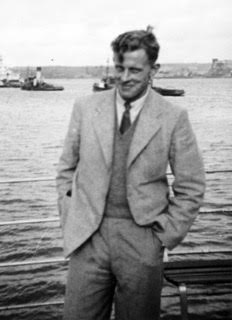Meg Peacocke — ‘Budleigh Salterton in the War Years: a Child’s View’
Meg Peacocke, a poet with wartime memories of Budleigh
Fairlynch Museum and the Otter
Valley Association are combining to present a talk on 13 October which will
give a special insight into life in Budleigh Salterton during the Second World War.
A sister of the composer Sir Richard Rodney Bennett, Meg
Peacocke is a distinguished poet who was brought up in Budleigh Salterton in
the 1940s.
A World War Two recruitment poster
Image © IWM
Local artist Joyce Dennys had suggested that the family move from the London area to Budleigh to escape the danger of Nazi bombing raids, and Meg’s father, the children’s author Rodney Bennett, served as a warden at the ARP hut on The Green.
Meg Peacocke’s poem ‘Walking to Church 1940’ is one of
several compositions which give a flavour of wartime life, describing how the
Bennett family made its way to Sunday services at All Saints Church in East
Budleigh.
A former teacher and Cumbrian hill farmer, a mother of four
and a trained counsellor, Meg Peacocke read English at Oxford after leaving
Cheltenham Ladies’ College.
Her first volume of poetry was not published until she was
in her fifties. Since then, her poems have received exceptionally favourable
reviews. She won the Cholmondeley Award for Excellence in Poetry in 2005 and
was awarded a Hawthornden Fellowship. In May this year she appeared at the
Poetry-next-the-Sea Festival in Norfolk,
alongside fellow-poets who included Dame Gillian Beer and Sir Andrew
Motion.
Meg Peacocke's talk
will take place on Monday 13 October at 7.30 pm in the Peter Hall, Budleigh
Salterton. Admission
costs £2.00 for OVA members/Friends of Fairlynch and £2.50 for non-members/Friends.
Walking to Church 1940
Walking to church, we stamp our shapes
on flat grey air, steel sea behind
rolled out in the same dimension
The lanes gritty with patience, elms
ranged in memory’s pop-up book
like barlines in the squareset hymns
we are shortly to sing. The squeezed
organ notes will bump like dinghies
waiting for the congregation
to shift themselves gingerly in,
but my father will steer the bass,
dominant, tonic, the known ropes.
It is warwork, like arranging
billets for evacuees, each
labelled and slotted into place.
Meanwhile the bells are swinging full
fathom through the changes, clashing
and colicky at times but sure
of a destination. So we
step briskly out between the pinched
February banks, the sun’s stare
pale above us; as though the frayed
geometry of fields and towns
that passing Spitfire sees will hold
just as long as we man the pews
in time to let the crotchets march
in their fervently sober ranks,
while rage
and loss stay locked in psalms.
Reproduced courtesy of the author
© Meg Peacocke






Comments
Post a Comment